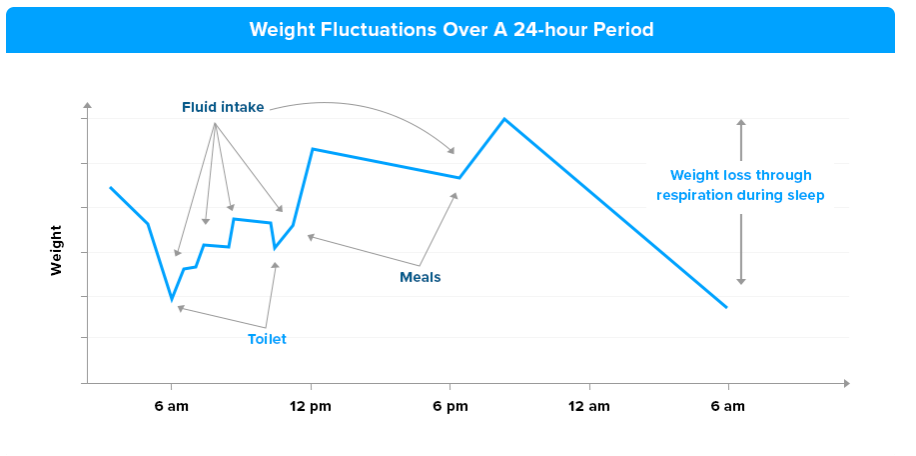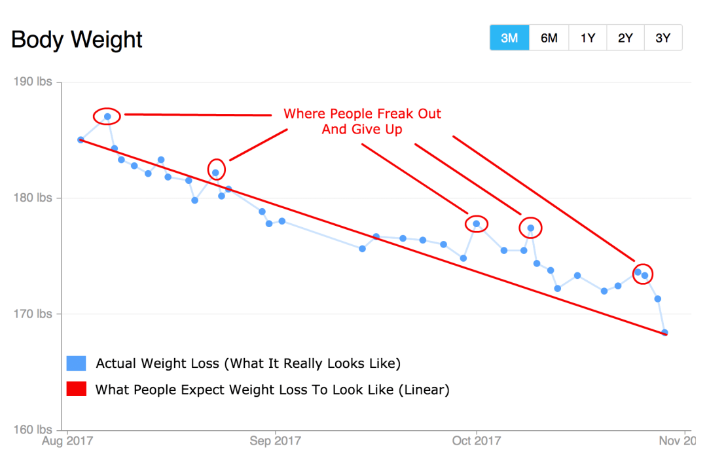Ever stepped on the scale and wondered why your weight seems to dance around day by day?
Even when you’re doing everything correctly by tracking calories and macros for shredding, your weight will still fluctuate (and even increase). This is normal.
The problem is when people don’t see their weight reducing in a linear and predictable manner on the scale, they give up!
In this article, I want to address the reasons why your weight will fluctuate from day to day, even if you are tracking your calories and macros accurately.
According to research, your average daily weight can fluctuate by 2 to 5 pounds.
The beginning of the day presents the lowest weight point, rising gradually throughout the day as meals and beverages are consumed. For a visual representation, check out the graph below:

This is one of the main reasons why I ask client’s to weigh themselves under the following conditions: first thing in the morning, before food/drink, after the bathroom, with minimal clothing. The aim is to obtain their lowest weight under the same conditions.
Many people believe that during a calorie deficit to maximise fat loss, weight loss should follow a smooth, linear process, like this (red line):
In reality, weight loss doesn’t follow a smooth, linear downward trend. Weight loss entails losing a pound one week, seeing no change for the next two, then experiencing a sudden three-pound drop the following week. You might find yourself gaining a pound back, only to shed it again a few days later, perpetuating this cycle.
What matters the most is the overall trend of weight decreasing with time.
Below is a recent client example where they’ve tracked their fluctuating daily weight, but their average weekly weight change is decreasing from week to week. I care about how the weekly average is moving (i.e., increase for a bulk or decreasing for a cut) rather than daily weigh-ins.
Listed below are several factors that play a role in these day-to-day weight changes:
- Food and liquids intake
- Carbohydrate intake
- Sodium intake
- Menstrual cycles
- Stress levels (i.e., cortisol) and more
Let’s explore the primary factors contributing to the fluctuations in body weight.
1. Food & Liquids
Consuming food leads to an instant increase in your weight since the weight of food doesn’t vanish when you eat it—it needs to traverse your digestive system first.
The typical meal carries a weight of a few ounces, causing a temporary increase of a few pounds in your daily weight.
No need to stress about it.
The weight gained from food is transitory and will diminish as your body processes the food and eliminates waste. This can take anywhere from 1 to 3 days, varying based on the individual and the meal’s composition.
2. Carbohydrate Intake
Carbohydrates encourage your body to retain water, so the more carbs you eat, the more water you retain. Your body converts the carbs you consume into glycogen, storing it away in your muscles and liver.
For every gram of stored glycogen, your body will hold 3 to 4 grams of water, which is why eating a high-carb meal will cause your weight to increase.
For example, eating a Domino’s cheese pizza, which has 288 grams of carb, will result in the storage of an additional 860 grams of water in the liver and muscles. That’s a total of 1150 grams between carbohydrate and water, which is 1150 grams (or 2.5 lbs!).
When you jump on the scale the next day after eating your pizza, expect your weight to jump by 2.5 to 3 pounds (mostly water weight).
As you can see, there is nothing to worry about as the increase in weight is mostly water weight and will drop again after 24 to 48 hours.
3. Sodium Intake
Sodium brings water into cells, which is why eating salty foods can make you gain several pounds (of water weight) within hours.
This is why some people report feeling puffy after eating very high salt foods like take-out foods and salty restaurant meals. Similarly to water retention caused by carb intake, water retention due to salty food intake is only temporary and your body fluid levels will return to normal after 24 to 48 hours.
4. Menstrual Cycle
This obviously is only applicable to female clients as they will typically report a water weight increase of around 3 to 5 pounds!
Weight fluctuations during the menstrual cycle are a well-known occurrence tied to hormonal shifts.
For instance, during the initial phase of the menstrual cycle (the “follicular phase”), oestrogen levels rise, which is associated with mild fluid retention, resulting in slight weight gain.
Oestrogen also curbs hunger, boosts leptin production, and mimics leptin’s effects in the brain, which can help control cravings and potentially reduce the likelihood of weight gain through overeating.
As oestrogen levels fall after ovulation, leptin and the hormone serotonin sink and progesterone rises, increasing hunger and cravings for carb-rich food and, thus, the risk of binge eating and water retention.
The menstrual cycle also influences gastrointestinal transit time.
5. Stress
Prolonged stress prompts the body to produce cortisol, a hormone that causes your weight to fluctuate for four main reasons:
- It increases water retention.
- It increases ghrelin, which goads you into eating more, increasing food weight in your body.
- It triggers cravings for “comfort foods.” These foods bump up your body weight because they’re easy to overeat (increasing food weight) and they’re usually high in sodium (exacerbating water retention).
- It may disrupt your sleep, which can cause lower leptin (the “satiety hormone”) levels and promote further overeating.
The best ways to reduce cortisol are:
- Get plenty of sleep.
- Drink less alcohol.
- Engage in relaxing activities such as reading, listening to calming music, or walking.
- Eat a nutritious diet.
- Do low-to-moderate-intensity exercise.
- Take supplements, such as fish oil and ashwagandha.
To Summarise
Embrace the natural ebb and flow of daily weight changes, and there’s no need to dwell on minor ups and downs.
Instead, focus on how your weekly average weight is changing! Is it moving up or down? Also, look at your body measurements. Is your waist measurement increasing or decreasing? When I’m working with client’s in one-on-coaching, I’m also looking at how their body measurements are changing (not just their average weekly weight).
It’s possible that a client’s weekly average weight will increase while in a calorie deficit, but their waist measurement is decreasing. This indicates a body recomposition.
If you haven’t already, download the tracking spreadsheet from within the Ultimate Body Transformation program and start recording your daily weigh-ins and allow the spreadsheet to calculate the weekly average for you.
Consistently track these averages over time to gauge whether you’re moving in the direction of your desired progress. It’s a more comprehensive and forgiving way to assess your weight journey.






















